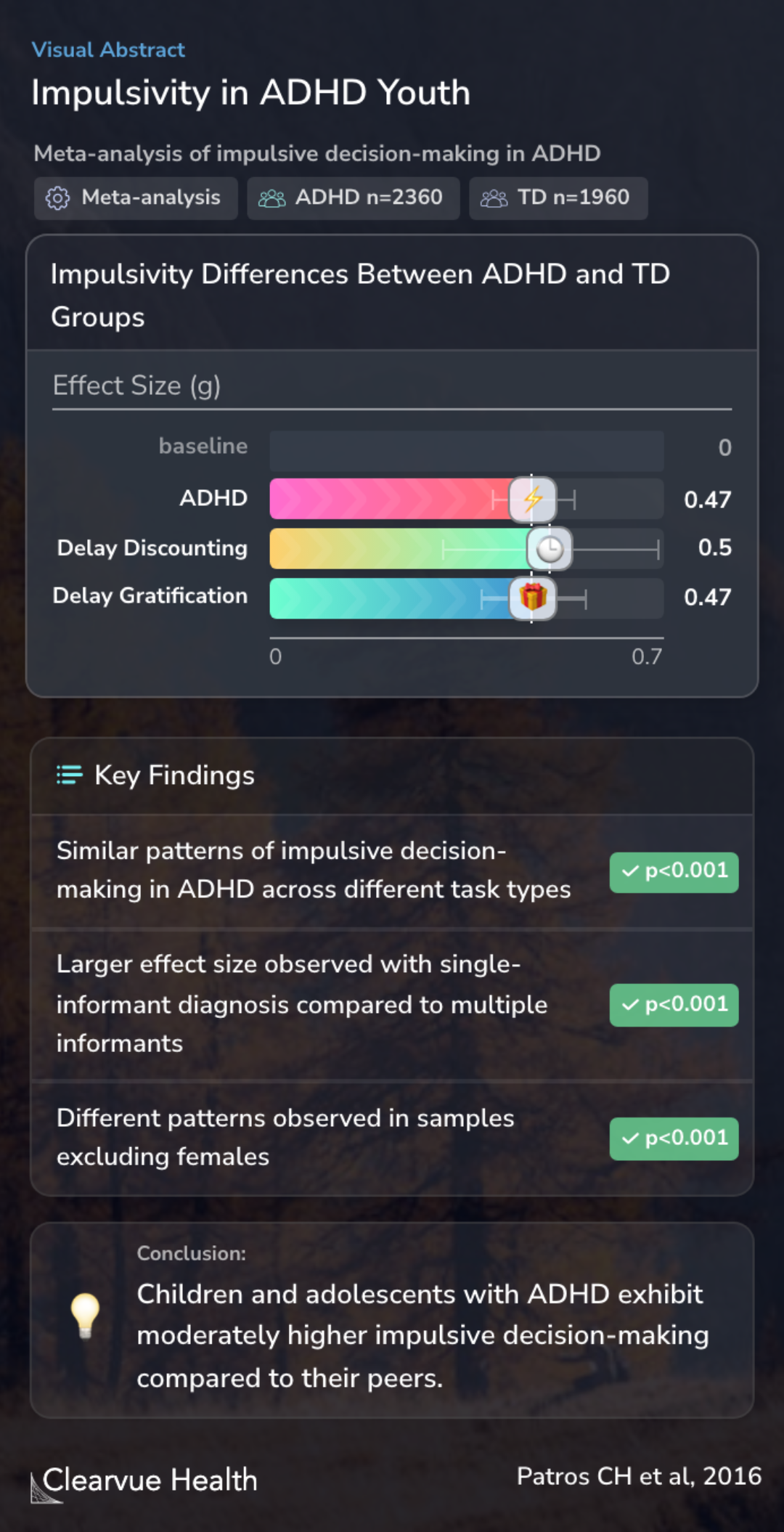Choice-Impulsivity in ADHD: Child and Adolescent Review
Impulsivity in ADHD Youth
Patros CH;Alderson RM;Kasper LJ;Tarle SJ;Lea SE;Hudec KL

Objectives
Impulsive behavior is a key feature of ADHD, a condition that affects attention and activity levels. This behavior can lead to negative outcomes and is complex, with two main types: acting quickly without thinking (rapid-response impulsivity) and struggling to wait for rewards (reward-delay impulsivity or choice-impulsivity).
Impulsive behavior is a core DSM-5 diagnostic feature of attention-deficit/hyperactivity disorder (ADHD) that is associated with several pejorative outcomes. Impulsivity is multidimensional, consisting of two sub-constructs: rapid-response impulsivity and reward-delay impulsivity (i.e., ...
Methods
This study used a method called meta-analysis to look closely at how children and teenagers with and without ADHD differ in their ability to wait for rewards. The researchers gathered data from 28 different tasks in 26 studies involving 4,320 children in total (2,360 with ADHD and 1,960 without).
This review used meta-analytic methods to comprehensively examine between-group differences in choice-impulsivity among children and adolescents with and without ADHD. Twenty-eight tasks (from 26 studies), consisting of 4320 total children (ADHD=2360, TD=1,960), provided sufficient infor...
Results
The findings showed that children and teenagers with ADHD tend to make more impulsive decisions compared to those without ADHD. The difference in impulsiveness was moderate. This pattern was consistent across different tasks that tested their ability to delay gratification or discount delay. Interestingly, when only one person (like a parent or teacher) reported on a child's behavior, the difference in impulsiveness between those with and without ADHD was more pronounced. Also, the pattern of impulsiveness was different in studies that did not include females.
Results revealed a medium-magnitude between-group effect size (g=.47), suggesting that children and adolescents with ADHD exhibited moderately increased impulsive decision-making compared to TD children and adolescents. Further, relative to the TD group, children and adolescents with ADH...
Conclusions
Overall, the study found that children and teenagers with ADHD are more likely to make quick, less thought-out decisions compared to their peers. These findings are important for understanding and treating ADHD, especially when considering how to help these individuals with their impulse control.
The meta-analytic review demonstrated that children and adolescents with ADHD showed moderately increased impulsive decision-making compared to typically developing (TD) children and adolescents. The findings highlight the importance of considering choice-impulsivity in the assessment an...
Key Takeaways
Context
A study by Marco et al. in 2009 explored how ADHD impacts decision-making related to rewards and delays. It found that those with ADHD prefer smaller, immediate rewards over larger ones that require waiting, suggesting a difficulty in delaying gratification. This difficulty could make people with ADHD more inclined to choose options that offer immediate satisfaction, even if they are less beneficial in the long run.
Additionally, impulsivity can affect social interactions and increase the risk of addiction and reckless behavior. These studies show that impulsivity, especially in ADHD, has significant effects on various aspects of life and decision-making.